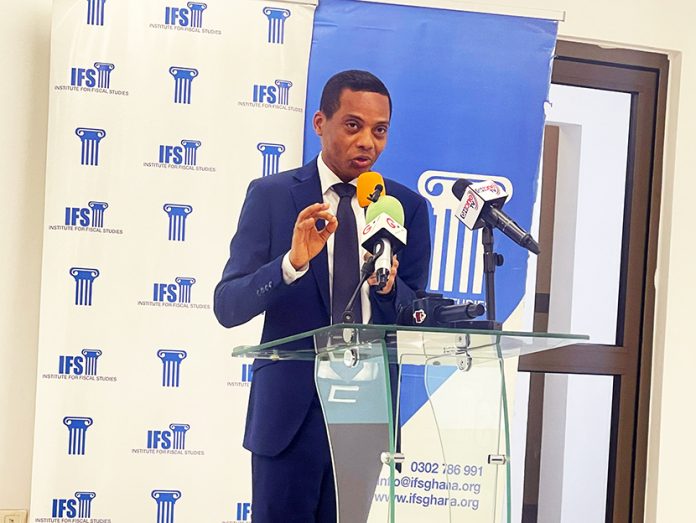The Institute for Fiscal Studies (IFS) says the government’s much-touted ‘Big Push’ infrastructure agenda has been rendered inconsequential, due to severe fiscal challenges that derailed capital spending in the first half of 2025.
Presenting the Think Tank’s assessment of the 2025 Mid-Year Fiscal Policy Review in Accra on Wednesday, August 20, 2025 Senior Research Fellow, Mr Leslie Dwight Mensah, revealed that while Ghana’s macroeconomic environment showed signs of recovery, underlying fiscal realities painted a more troubling picture.
“Contrary to the Minister’s cheerful remarks on revenue performance, revenue collection did not meet expectations in the first half of the year,” the IFS observed, pointing to a shortfall of GH₵3.24 billion.
Domestic revenue underperformed by GH₵2.90 billion (2.9% below target) while foreign grants fell short by GH₵338.72 million (31.7% below target).
The IFS noted that government’s fiscal deficit appeared much lower than projected not because of deliberate discipline, but largely because of “difficult fiscal conditions” that forced massive under spending.
Actual expenditure fell short by as much as GH₵21.17 billion on a cash basis, leading to sharp cuts in critical areas.
Most strikingly, capital expenditure was slashed by over 60 percent. “Capital expenditure fell short by as much as GH₵10.95 billion from the programmed GH₵18.06 billion to a mere GH₵7.11 billion,” the IFS stressed.
This, it added, meant the government’s ambitious Big Push infrastructure agenda had effectively collapsed even before implementation could take off.
The think tank also raised red flags about arrears payments which were 36.2 percent below target.
Instead of the planned GH₵7.50 billion, only GH₵4.78 billion was paid, deepening liquidity challenges for contractors and worsening non-performing loans in the banking system.
The funding crisis even affected flagship programmes.
The Ghana Gold Board (GoldBod), which had been allocated GH₵4.55 billion as seed money, received no disbursement at all.
“Even its flagship policy initiative was not spared,” the IFS said.
On the revenue side, the revised 2025 budget projected an additional GH₵2.87 billion, mainly from a new GH₵1 petroleum levy under ESLA.
However, the IFS dismissed the revised projections as unrealistic, warning that “the revised revenue projection does not account for the shortfalls in the first half of the year and consequently looks unlikely to be achieved.”
According to IFS, the government maintained ambitious targets for oil, import duties, and non-tax revenues despite recording significant shortfalls earlier in the year.
“To achieve the revised revenue target, the government must close the gap and simultaneously meet its original second-half target, which will be very difficult to achieve,” the report cautioned.
The IFS further criticised the government for neglecting to harness Ghana’s extractive sector for meaningful revenue generation.
Despite President John Mahama’s call in April for Africa to take advantage of its natural resources, the fiscal review failed to outline a clear strategy.
“Without repositioning the country for effective revenue mobilization from the extractive sector, Ghana will not see the light of genuine development,” the IFS warned, citing Botswana and Gulf States as examples of countries that used their resources to drive transformational growth.
Another concern raised was the partial reporting of support to the National Investment Bank (NIB). Government announced a GH₵2.45 billion recapitalisation package, but only GH₵450 million was captured in the fiscal accounts, leaving out GH₵1.5 billion in bonds and GH₵500 million in government shares. The IFS stressed that this omission understated the fiscal deficit and contradicted commitment-based reporting standards.
Going forward, the IFS recommended a fundamental reset of revenue mobilization, urging government to abandon the concession regime in the extractive sector in favour of production sharing agreements or active state participation.
It also advised against an early return to the international bond market, warning of a potential relapse into another debt crisis.
“The difficult revenue and financing conditions underscore the urgency for drastic reforms in revenue mobilization.
“Without this, Ghana risks being trapped in limited growth, underfunded infrastructure and recurring debt crises,” the IFS concluded.









